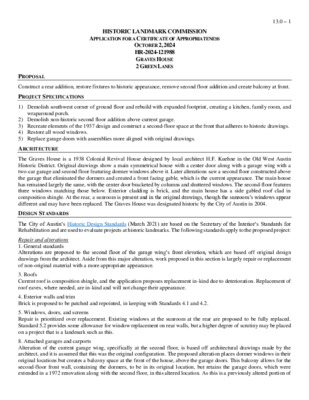13.0 - 2 Green Lanes — original pdf
Backup

HISTORIC LANDMARK COMMISSION APPLICATION FOR A CERTIFICATE OF APPROPRIATENESS OCTOBER 2, 2024 HR-2024-121988 GRAVES HOUSE 2 GREEN LANES 13.0 – 1 PROPOSAL PROJECT SPECIFICATIONS wraparound porch. ARCHITECTURE Construct a rear addition, restore fixtures to historic appearance, remove second floor addition and create balcony at front. 1) Demolish southwest corner of ground floor and rebuild with expanded footprint, creating a kitchen, family room, and 2) Demolish non-historic second floor addition above current garage. 3) Recreate elements of the 1937 design and construct a second-floor space at the front that adheres to historic drawings. 4) Restore all wood windows. 5) Replace garage doors with assemblies more aligned with original drawings. The Graves House is a 1938 Colonial Revival House designed by local architect H.F. Kuehne in the Old West Austin Historic District. Original drawings show a main symmetrical house with a center door along with a garage wing with a two-car garage and second floor featuring dormer windows above it. Later alterations saw a second floor constructed above the garage that eliminated the dormers and created a front facing gable, which is the current appearance. The main house has remained largely the same, with the center door bracketed by columns and shuttered windows. The second-floor features three windows matching those below. Exterior cladding is brick, and the main house has a side gabled roof clad in composition shingle. At the rear, a sunroom is present and in the original drawings, though the sunroom’s windows appear different and may have been replaced. The Graves House was designated historic by the City of Austin in 2004. DESIGN STANDARDS The City of Austin’s Historic Design Standards (March 2021) are based on the Secretary of the Interior’s Standards for Rehabilitation and are used to evaluate projects at historic landmarks. The following standards apply to the proposed project: Repair and alterations 1. General standards Alterations are proposed to the second floor of the garage wing’s front elevation, which are based off original design drawings from the architect. Aside from this major alteration, work proposed in this section is largely repair or replacement of non-original material with a more appropriate appearance. 3. Roofs Current roof is composition shingle, and the application proposes replacement in-kind due to deterioration. Replacement of roof eaves, where needed, are in-kind and will not change their appearance. 4. Exterior walls and trim Brick is proposed to be patched and repointed, in keeping with Standards 4.1 and 4.2. 5. Windows, doors, and screens Repair is prioritized over replacement. Existing windows at the sunroom at the rear are proposed to be fully replaced. Standard 5.2 provides some allowance for window replacement on rear walls, but a higher degree of scrutiny may be placed on a project that is a landmark such as this. 8. Attached garages and carports Alteration of the current garage wing, specifically at the second floor, is based off architectural drawings made by the architect, and it is assumed that this was the original configuration. The proposed alteration places dormer windows in their original locations but creates a balcony space at the front of the house, above the garage doors. This balcony allows for the second-floor front wall, containing the dormers, to be in its original location, but retains the garage doors, which were extended in a 1972 renovation along with the second floor, in this altered location. As this is a previously altered portion of 13.0 – 2 the house, this may meet Standard 8.2 for matching original material. Residential additions 1. Location Addition is located at the side and rear of the original building, behind the garage wing. The family room would be visible to the side of the front elevation. Per Standards 1.2 and 1.3, this projection would be set back over halfway back from the front. 2. Scale, massing, and height The addition is an expansion of one corner of the first floor only, and the appearance is keeping with several projecting rooms at the rear of the buildings, such as at the sunroom extension at the opposite corner. The wraparound porch increases the footprint of the addition, but as it is not enclosed, the visual intrusion is kept to a minimum. 3. Design and style Design details of the family room and porch are simple and compatible. The arbor is not out of place on a back porch but should be cautioned so as not to be too ornate in design. 4. Roofs A hipped roof is proposed over the ground floor addition, which minimizes the visibility from the front of the property. The main house is gabled, for which the addition proposes a different yet compatible form. 5. Exterior walls Rear cladding will be wood lap. While the front of the building is all brick, other historic areas of the rear feature similar wood lap, which allows for its use at the addition. 6. Windows, screens, and doors New windows at the addition are proposed to be metal clad wood windows in material, and they will be double hung in form. They will be minimally visible from the front of the house. 7. Porches and decks The new porch is in a location that will not be visible from the front of the building. It will be level with the first floor and compatible in material. 9. Attached garages and carports As discussed in the alterations section above, the second floor will be altered to move its front wall to its historic location, while retaining the first-floor front wall at its current location. Summary The project meets some of the applicable standards. STAFF RECOMMENDATION Comment on plans, and recommend the applicant attend the next meeting of the Architecture Review Committee scheduled for October 9th. LOCATION MAP 13.0 – 3 PROPERTY INFORMATION Photos 13.0 – 4 Google Streetview, 2024